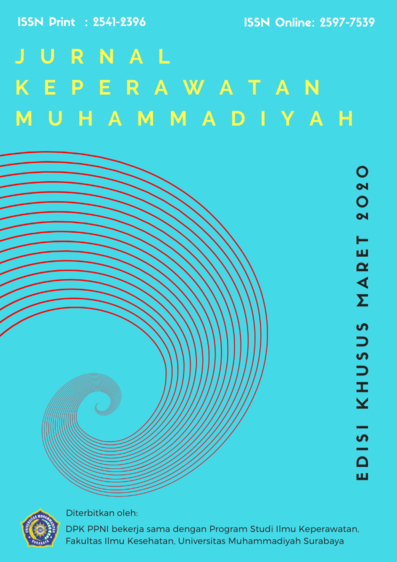Peningkatan Pengetahuan Ibu Tentang Iud Pasca Persalinan Setelah Diberikan Strategi Konseling Berimbang (SKB) Dengan Video Learning
DOI:
https://doi.org/10.30651/jkm.v5i2.4063Keywords:
SKB, Video Learning, Pengetahuan, IUD Pasca PersalinanAbstract
Objective: This study aims to analyze the differences in pre and post treatment knowledge in thegroup of SKB Â without and SKB with Video Learning.
Method: This type of research uses quasy experiments (pre-post test design). The study was conducted at the UPTD Puskesmas Pitumpanua Wajo Regency in November to December 2019. The sample in this study was 44 third trimester pregnant women each group (control group (LCS) and treatment (LCS with Video Learning) selected based on purposive sampling techniques. Counseling is carried out twice, namely in the antenatal period and 12 hours after delivery Data analysis with the Homogeneity of variance test and the Wilcoxon test.
Results: Statistical test results showed that in the control group (p value: 0.001 <0.05) and intervention (pvalue: <0.001 <0.05) there were significant differences in knowledge before and after treatment. Increased knowledge in the intervention group was faster seen in the initial measurement to the first measurement while in the control group it was seen in the initial measurement to the second measurement.
Conclusion: There are differences in pre and post treatment knowledge in the SKB and SKB groups with Video Learning. The counseling method uses SKB with faster video learning in increasing maternal knowledge about postpartum IUDs.
Â
References
Buch, S. V., et al. 2014. Video- or Text-based E-learning When Teaching Clinical Procedures? A Randomized Controlled Trial. Advances in Medical Education and Practice. 5: 257-262.
Dineley, B., et al. 2018. Video Media in Clinic Waiting Areas Increases Interest in Most Effective Contraceptive Methods. Journal of Obstetrics and Gynaecology Canada. 40 (10): 1302–1308.
Dirjen Bina Kesehatan Ibu, Dirjen Bina Gizi dan KIA. 2014. Pedoman Pelayanan Keluarga Berencana Pasca Persalinan di Fasilitas Kesehatan. Jakarta: Kementerian Kesehatan RI.
Fitri, I. 2018. Nifas, Kontrasepsi Terkini dan Keluarga Berencana. Gosyen Publishing. Yogyakarta.
Frarey, A., et al. 2018. Postpartum Contraceptive Counseling for Fist Time Adolescent Mother : A Randomized Controlled Trial. Archive of Obstetri and Gynekologi. 19: 141
Gebremariam, A., and Addissie, A. 2014. Knowledge and Perception on Long Acting and Permanent Contraceptive Methods in Adigrat Town, Tigray, Northern Ethiopia: A Qualitative Study. International Journal of Family Medicine.2014. 1–6.
Gibbs, S. E., et al. 2016. Long-Acting Reversible Contraception Counseling and Use for Older Adolescents and Nulliparous Women. Journal of Adolescent Health. 59 (6): 703–709. H
Giho, Y., et al. 2019. Feasibility and Acceptability of Using a Web-based Contraceptive Support Tool in a University Health Clinic. Journal of American College Health. 0 (0): 1–5.
Haris, V. S. D. 2017. Konseling KB Menggunakan Flash Card Terhadap Peningkatan Pengetahuan dan Sikap dan Keikutsertaan Kontrasepsi IUD dan MOW Pascasalin. Jurnal Kesehatan. VII (2): 296-304.
Kementerian Kesehatan RI. 2013. Situasi Keluarga Berencana di Indonesia. Buletin Jendela Data dan Informasi Kesehatan. Jakarta
Keogh, S. C., et al. 2015. Postpartum Contraception in Northern Tanzania: Patterns of Use, Relationship to Antenatal Intentions, and Impact of Antenatal Counseling. Studies in Family Planning. 46 (4), 405–422.
Mega and Wijayanegara. 2017. Asuhan Kebidanan Keluarga Berencana. CV. Trans Info Media. Jakarta.
Nurdiana, A., Fiman, W. and Mutyara, K. 2016. Pengembangan Model Konseling Berbasis Video. 2-TRIK (Tunas-Tunas Riset Kesehatan). VI (4).187-191.
Pusdiklat Kependudukan dan KB BKKBN 2018. Kerangka Acuan Kerja TOT Strategi Konseling Berimbang. Jakarta.
Sapkota, S., Rajbhandary, R. and Lohani, S. 2017. The Impact of Balanced Counseling on Contraceptive Method Choice and Determinants of Long Acting and Reversible Contraceptive Continuation in Nepal. Maternal and Child Health Journal. 21 (9). 1713–1723.
Sugiyono. 2016a. Metode Penelitian Kombinasi (Mixed Methods). Cetakan ke-8. Alfabeta. Bandung.
Sugiyono. 2016b. Metode Penelitian Manajemen. Cetakan ke-5. Alfabeta. Bandung.
Suiroka, P. 2012. Media Pendidikan Kesehatan. Graha Ilmu. Yogyakarta.
Torres, L. N., et al. 2018. Increasing IUD and Implant Use Among Those at Risk of a Subsequent Preterm Birth: A Randomized Controlled Trial of Postpartum Contraceptive Counseling. Women’s Health Issues. 28 (5). 393–400.
Toscano, M., et al. 2019. Antepartum Contraceptive Counseling in Women with Preterm Birth. American Journal of Perinatology. 1.
Yaumi, M. 2018. Media dan Teknologi Pembelajaran. Prenadamedia Group. Jakarta.
Zapata, L. B., et al. 2015. Contraceptive Counseling and Postpartum Contraceptive Use. American Journal of Obstetrics and Gynecology. 212 (2), 171.e1-171.e8.
Zivich, P. N., et al. 2018. Effect of Family Planning Counseling After Delivery on Contraceptive Use at 24 Weeks Postpartum in Kinshasa, Democratic Republic of Congo. Maternal and Child Health Journal. 23 (4): 530–537.
Downloads
Published
Issue
Section
License
- Penulis tetap memegang hak atas karyanya dan memberikan hak publikasi pertama kepada jurnal ini yang secara simultan karya tersebut dilisensikan di bawah:Â Creative Commons Attribution-ShareAlike 4.0 International (CC BY-SA 4.0)













